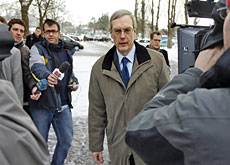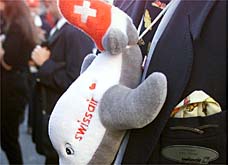Corti blames banks for “strangling” Swissair

Former Swissair head Mario Corti has attacked Switzerland's major banks for their alleged role in the financial collapse of the airline.
Corti, who was chief executive of the SAirGroup – the carrier’s parent group – during its last months of existence in 2001, told a Zurich court that the company had been “strangled”.
The former CEO is one of 19 top executives and board members facing charges that include damaging creditors, mismanagement, making false statements about the business and forging documents.
Corti said Project Phoenix, the rescue plan drawn up over the weekend of September 30, 2001, by the executive board, and involving UBS and Credit Suisse, had been developed behind his back.
“The Swissair group was strangled by […] Phoenix,” said Corti. “The worst solution prevailed.”
The plan foresaw the regional airline Crossair being released from the group, together with restructuring and recapitalisation, so that the activities of the struggling national carrier could be taken over. UBS and Credit Suisse were supposed to buy Swissair’s 70 per cent shareholding in Crossair.
Corti added that the request for creditor protection and the grounding had been integral parts of this plan imposed by the banks.
Convinced
Former finance minister Kaspar Villiger had described the rescue plan as a “document of capitulation” when it landed on his desk after the decisive weekend meeting.
Corti said he had made clear to Villiger that he didn’t agree with requesting creditor protection, as it would have seriously devalued the company. Swissair left behind debts to the tune of SFr17 billion ($13.7 billion) and its collapse resulted in 5,000 lost jobs.
During his testimony, Corti took swipes at UBS, which he referred to as “quite a big bank” and “that institution” without naming it.
The former chief executive remains convinced that Swissair could have been restructured, “the whole package of measures was there” and, unlike the prosecution, believes that it had sufficient funds on September 17, 2001 – the day it asked the government for a SFr1-billion ($800 million) loan.
He denied having delayed the request for creditor protection of Swissair. The procedure was launched on October 4, 2001, while the prosecution claims that it should have begun earlier.
Corti said these accusations were “baseless and unfounded” and that his strategy had been “realistic”.
Jacqualyn Fouse, the former financial officer of the SAirGroup, rejected charges of waiting too long to request protection for the group from its creditors.
Fouse, who joined the company in June, 2001 said she had believed the group could be rescued up until October 1.
The American, who is now head of finances at the Alcon pharmaceutical group,also criticised the attitude of UBS at the time.
swissinfo with agencies
Swissair planes were grounded in October 2001, after the company had been in business for 71 years.
The downturn in the aviation market after the terrorist attacks of September 11, 2001, proved the last straw for the heavily indebted Swissair, which folded the following year.
The airline collapsed after buying stakes in numerous loss-making airlines, including Belgium’s Sabena and Poland’s Lot, in an attempt to form its own airline alliance.
Swissair left behind debts to the tune of SFr17 billion ($13.7 billion) and resulted in 5,000 job losses.
The remains of Swissair and the regional carrier Crossair were brought together in 2002 to form the new national carrier Swiss, which was in turn taken over by Germany’s Lufthansa in 2005.
The trial opened on January 16 and should run until March 9 at Bülach district court near Zurich.
There are 19 defendants.
The investigation took five years and produced 280 metres worth of documents.
The prosecution’s indictment runs to 100 pages.
All the defendants who have so far appeared have proclaimed their innocence.
Apart from Bruggisser, Corti and Schmidheiny, all the others refused to answer questions because it could prejudice civil proceedings brought by former employees and shareholders seeking compensation.

In compliance with the JTI standards
More: SWI swissinfo.ch certified by the Journalism Trust Initiative












You can find an overview of ongoing debates with our journalists here . Please join us!
If you want to start a conversation about a topic raised in this article or want to report factual errors, email us at english@swissinfo.ch.